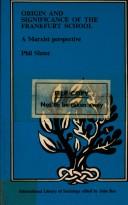| Listing 1 - 4 of 4 |
Sort by
|

ISBN: 0710084382 9780710084385 Year: 1977 Publisher: London Routledge and Kegan
Abstract | Keywords | Export | Availability | Bookmark
 Loading...
Loading...Choose an application
- Reference Manager
- EndNote
- RefWorks (Direct export to RefWorks)
Bibliotheek François Vercammen
Sociological theories --- Frankfurt School of Sociology --- History --- Institut für Sozialforschung (Frankfurt am Main, Germany) --- 141.82 --- Frankfurt school of sociology --- -Critical theory (Sociology) --- Frankfurt school --- Frankfurt sociologists --- Schools of sociology --- Critical theory --- Marxian school of sociology --- Wetenschappelijk socialisme. Marxisme. Marxisme-Leninisme. Dialectisch materialisme. Communisme --- Institut fur Sozialforschung (Frankfurt am Main, Germany) --- IFS --- Frankfurt Institute for Social Research --- Scuola di Francoforte sul Meno --- Istituto di ricerca sociale di Francoforte sul Meno --- Istituto per la ricerca sociale di Francoforte sul Meno --- Frankfurt School --- Institute of Social Research (New York, N.Y.) --- Columbia University. --- New York (N.Y.). --- International Institute of Social Research --- I.F.S. --- Frankfurt am Main. --- Frankfurter Schule --- Ecole de Francfort --- Universität Frankfurt am Main. --- History. --- -Wetenschappelijk socialisme. Marxisme. Marxisme-Leninisme. Dialectisch materialisme. Communisme --- 141.82 Wetenschappelijk socialisme. Marxisme. Marxisme-Leninisme. Dialectisch materialisme. Communisme --- -141.82 Wetenschappelijk socialisme. Marxisme. Marxisme-Leninisme. Dialectisch materialisme. Communisme --- Critical theory (Sociology) --- CDL --- 14 --- Frankfurt School of Sociology - History
Book
ISBN: 0906133319 0391018892 Year: 1980 Publisher: London : Ink Links,
Abstract | Keywords | Export | Availability | Bookmark
 Loading...
Loading...Choose an application
- Reference Manager
- EndNote
- RefWorks (Direct export to RefWorks)
Communism and science. --- Communism and technology. --- Science --- Technology --- Social aspects. --- Social aspects.
Book
Year: 1977 Publisher: London, Henley, Boston Routledge & Kegan Paul
Abstract | Keywords | Export | Availability | Bookmark
 Loading...
Loading...Choose an application
- Reference Manager
- EndNote
- RefWorks (Direct export to RefWorks)
Book
ISBN: 1000155889 Year: 2020 Publisher: Routledge
Abstract | Keywords | Export | Availability | Bookmark
 Loading...
Loading...Choose an application
- Reference Manager
- EndNote
- RefWorks (Direct export to RefWorks)
The term 'Frankfurt School' is used widely, but sometimes loosely, to describe both a group of intellectuals and a specific social theory. Focusing on the formative and most radical years of the Frankfurt School, during the 1930s, this study concentrates on the Frankfurt School's most original contributions made to the work on a 'critical theory of society' by the philosophers Max Horkheimer and Herbert Marcuse, the psychologist Erich Fromm, and the aesthetician Theodor W. Adorno.Phil Slater traces the extent, and ultimate limits, of the Frankfurt School's professed relation to the Marxian critique of political economy. In considering the extent of the relation to revolutionary praxis, he discusses the socio-economic and political history of Weimar Germany in its descent into fascism, and considers the work of such people as Karl Korsch, Wilhelm Reich, Walter Benjamin and Bertolt Brecht, which directs a great deal of critical light on the Frankfurt School.While pinpointing the ultimate limitations of the Frankfurt School's frame of reference, Phil Slater also looks at the role their work played (largely against their wishes) in the emergence of the student anti-authoritarian movement in the 1960s. He shows that, in particular, the analysis of psychic and cultural manipulation was central to the young rebels' theoretical armour, but that even here, the lack of economic class analysis seriously restricts the critical edge of the Frankfurt School's theory. His conclusion is that the only way forward is to rescue the most radical roots of the Frankfurt School's work, and to recast these in the context of a practical theory of economic and political emancipation.
| Listing 1 - 4 of 4 |
Sort by
|

 Search
Search Feedback
Feedback About UniCat
About UniCat  Help
Help News
News